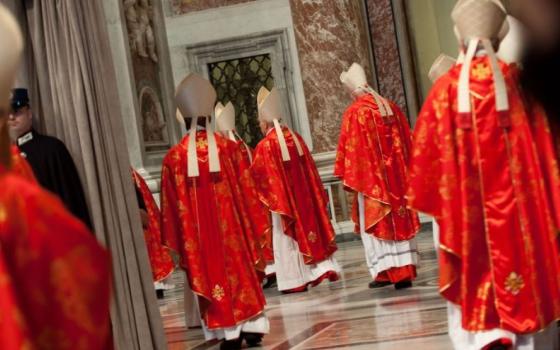Swiss Guards stand at attention as a nun passes by at the Vatican Nov. 9, 2020. (CNS/Reuters/Remo Casilli)
"I understood we were all like dogs. They told us to sit and we sat, to get up and we got up, to roll over and we rolled over," said an Australia-born religious identified only as "Sister Elizabeth" in the book, Veil of Silence.
After 30 years in religious life, she said she realizes she, too, had treated younger members of the congregation that way.
"Many still use that abusive behavior that has been passed down from generation to generation," she told Salvatore Cernuzio, a journalist and author of Il Velo del Silenzio (Veil of Silence), a book in Italian that was scheduled for publication Nov. 23.
This is the cover of the Italian book, Il Velo del Silenzio (Veil of Silence), by journalist Salvatore Cernuzio. (CNS/Courtesy of San Paolo publishing)
In an author's note, Cernuzio writes of a surprise meeting with a childhood friend who had joined a cloistered community of nuns; 10 years later, a "tribunal" of older sisters decided she did not have a vocation and sent her packing.
That encounter, he said, came just a few days after La Civiltà Cattolica published an article by Jesuit Fr. Giovanni Cucci, a professor of psychology and philosophy at Rome's Pontifical Gregorian University, calling for greater church attention to psychological and physical abuse in communities of women religious.
The book includes interviews with 11 women; one was sexually assaulted by a priest but was told by her superiors that she must have led him on. The others recount abuses of power and psychological or emotional abuse, mainly through acts of cruelty, humiliation and a denial of medical or psychological assistance.
Several of them mention how, particularly in the novitiate, they were required to ask permission to do or to have anything — including to take a shower or to have sanitary products during their menstrual cycle.
Aleksandra, who told Cernuzio about being abused by a priest, said she is looking for a way out of her community.
"I don't know where I'll go, I just want to follow Jesus, and it's not possible here. I can't live in this situation anymore and I'm afraid of destroying my physical, psychological and spiritual health. I hope to find help, maybe from some laypeople because I know that my congregation doesn't care about me," she said. "As I have heard so many times: the fault is always with the one who leaves."
— Cindy Wooden, Catholic News Service
Advertisement
Laudato Si' Action Platform continues to gain support from religious congregations
Congregations of sisters in the United States continue to sign on to the Laudato Si' Action Platform, the seven-year initiative to take concrete steps toward an environmentally sustainable future.
On Nov. 4, the Dominican Sisters of Peace, the Loretto Community, the Sisters of Charity of Nazareth and the Ursuline Sisters of Louisville teamed up to announce they were joining the seven-year, grassroots campaign to put Pope Francis' 2015 encyclical, "Laudato Si', on Care for Our Common Home," into action.
The action platform outlines seven categories of sustainability goals, including responding to societal and climate issues, rethinking ecological education, recovering ecological spirituality and adopting a sustainable lifestyle. The platform is already serving as a guiding force for many worldwide seeking to address issues of sustainability and climate justice.
On Nov. 15, the Springfield Dominicans announced their commitment.
"Actually, like many other women's religious congregations, we've been engaged in these actions for many years," said Sr. Sharon Zayac, who heads the congregation's committee overseeing the effort. She cites the Dominican Sisters' 22-year stewardship of the 164-acre eco spirituality center, Jubilee Farm, their study of and advocacy for human rights and the rights of Earth, and their recognition that global climate change disproportionately affects the most impoverished in the world, particularly women and children. "I firmly believe that while no individual person can possibly do enough to turn the tide of global climate disaster, without every person's individual commitments, we will never turn that tide."
Earlier this fall, commitments were made by the Congregation of Sisters of Bon Secours and the Franciscan Sisters of Perpetual Adoration.
— Dan Stockman, Global Sisters Report national correspondent
Groundskeeper of school run by sisters receives international environmental award
The gardener and groundskeeper at the St. Louise Inclusive School in Nouna, Burkina Faso — a project of the Daughters of Charity of St. Vincent de Paul, for disabled and non-disabled children — received Misean Cara's Individual Climate Action Award.
Lucien Diarra, the award's recipient, transformed the school's environment by planting and growing "microclimate within the school grounds," according to Misean Cara.
Misean Cara — an interfaith missionary organization based in Ireland — began these awards in 2020. Its three Climate Action Awards have been given to "individuals and projects by members that are showing innovation and commitment to counteracting the affects and impact of climate change on communities in the developing world," according to the website.
Throughout the school's compound, Diarra planted a significant number of trees, in addition to planting kitchen gardens so that the vegetables grown could be served in school meals. Originally, when the school opened in 2017, the lack of vegetation resulted in substantial dust culminating outside and inside the school, which was already located in a region where the rainy season on average lasts just three months a year.
The groundskeeper also shared the microclimate benefits to a larger population, conducting outreach to those in the surrounding ten villages (each with about 5,000 inhabitants), teaching them how to plant and maintain young trees on their properties.
Sr. Toyin Abegunde of the Daughters of Charity wrote that the sisters nominated Diarra "for his resilience in promoting climate change and encouraging others to do so in a difficult climate zone."
Sr. Anita Baird, a member of the Daughters of the Heart of Mary, addresses the National Black Catholic Congress in Chicago Aug. 30, 2002. (CNS/Northwest Indiana Catholic/Karen Callaway)
Virtual event presents the history of the National Black Sisters' Conference
Join Sr. Anita Baird of the Society of the Daughters of the Heart of Mary, at 8 p.m. Eastern time on Nov. 30, as she presents the history of the National Black Sisters' Conference in a virtual conversation hosted by FutureChurch, a Catholic reform organization.
The event is in recognition of November as Black Catholic History Month. According to the press release for the event, "there is hardly any aspect of our shared history more important that the emergence of the National Black Sisters' Conference in 1968. The powerful witness of Black Catholic women religious is an integral part of the struggle to upend racism and white supremacy in the church and in society."
Today, the National Black Sisters' Conference includes more than 150 Black Catholic women religious and associates in the United States "striving to promote a positive self-image among ourselves and our people," the press release continues. "Together, they form a strong and cohesive voice in support of the dignity and rights of women of color, in creating mentoring and support systems for Black women in religious formation, in educating the African American family, and in confronting the sin of racism, which continues to permeate our society and Church as we work tirelessly for the liberation of African American people."
Baird, who will be leading the event, is a longtime member of the conference and has served as its president, vice president and is on the board of directors. She has long been recognized for her activism, spending more than two decades of her ministry focused on racial justice, and in 2018 she was given the Outstanding Leadership Award by the Leadership Conference of Women Religious.
To register for the event, which is free to the public, click here.








